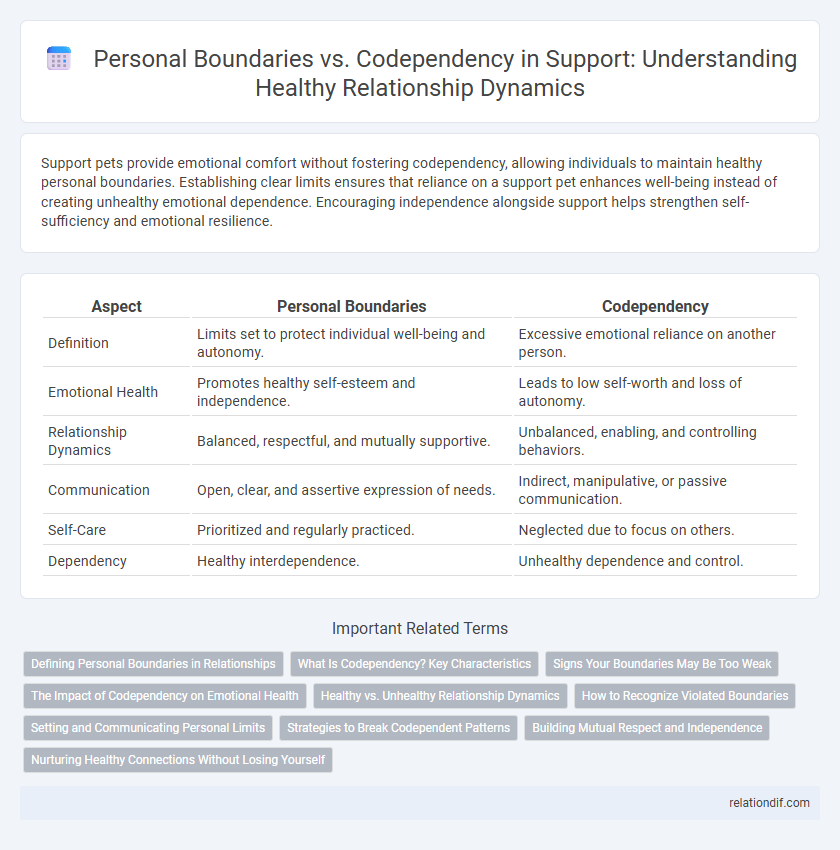Support pets provide emotional comfort without fostering codependency, allowing individuals to maintain healthy personal boundaries. Establishing clear limits ensures that reliance on a support pet enhances well-being instead of creating unhealthy emotional dependence. Encouraging independence alongside support helps strengthen self-sufficiency and emotional resilience.
Table of Comparison
| Aspect | Personal Boundaries | Codependency |
|---|---|---|
| Definition | Limits set to protect individual well-being and autonomy. | Excessive emotional reliance on another person. |
| Emotional Health | Promotes healthy self-esteem and independence. | Leads to low self-worth and loss of autonomy. |
| Relationship Dynamics | Balanced, respectful, and mutually supportive. | Unbalanced, enabling, and controlling behaviors. |
| Communication | Open, clear, and assertive expression of needs. | Indirect, manipulative, or passive communication. |
| Self-Care | Prioritized and regularly practiced. | Neglected due to focus on others. |
| Dependency | Healthy interdependence. | Unhealthy dependence and control. |
Defining Personal Boundaries in Relationships
Personal boundaries in relationships are essential for maintaining individual autonomy and emotional well-being by clearly defining acceptable behaviors and limits. Establishing these boundaries helps prevent codependency, where one person excessively relies on another for approval or emotional support. Clear communication about needs and limits fosters healthier, balanced interactions that respect each partner's independence and personal space.
What Is Codependency? Key Characteristics
Codependency is a dysfunctional relationship pattern where individuals prioritize others' needs over their own, often sacrificing personal boundaries to maintain approval. Key characteristics include an excessive need for control, difficulty saying no, and an overwhelming fear of abandonment. Recognizing these traits helps differentiate codependency from healthy boundary-setting essential to emotional well-being.
Signs Your Boundaries May Be Too Weak
Signs your boundaries may be too weak include feeling responsible for others' emotions, difficulty saying no, and constant people-pleasing behavior. Overextending yourself to avoid conflict or gain approval often leads to resentment and burnout. Recognizing these patterns is crucial to establishing healthier personal boundaries and reducing codependency.
The Impact of Codependency on Emotional Health
Codependency often leads to blurred personal boundaries, resulting in emotional exhaustion and decreased self-esteem. Individuals trapped in codependent relationships may neglect their own needs, increasing stress and anxiety levels. Establishing healthy boundaries is essential to protect emotional health and foster balanced, supportive connections.
Healthy vs. Unhealthy Relationship Dynamics
Personal boundaries establish a foundation for respect and emotional safety, ensuring individuals maintain their autonomy while engaging in relationships. Codependency blurs these boundaries, fostering unhealthy relationship dynamics marked by excessive reliance on others for self-worth and decision-making. Recognizing and enforcing healthy boundaries promotes mutual respect and emotional well-being, whereas codependency often leads to imbalance and emotional distress.
How to Recognize Violated Boundaries
Recognizing violated personal boundaries involves noticing feelings of discomfort, resentment, or exhaustion after interactions, which may indicate that others are imposing their needs excessively. Signs include difficulty saying "no," chronic people-pleasing, and an overriding sense of responsibility for others' emotions or decisions. Observing these patterns helps distinguish codependency from healthy boundaries by highlighting when support crosses into self-neglect.
Setting and Communicating Personal Limits
Setting and communicating personal limits is essential to maintain healthy relationships and avoid codependency. Clear boundaries protect emotional well-being by defining acceptable behaviors and fostering mutual respect. Assertive communication ensures that personal needs are acknowledged without guilt, promoting independence and balanced support.
Strategies to Break Codependent Patterns
Establishing clear personal boundaries is crucial for breaking codependent patterns, enabling individuals to prioritize their own needs and emotions without guilt. Techniques such as assertive communication, self-reflection, and seeking therapy help reinforce independence and reduce unhealthy emotional reliance. Developing self-awareness and practicing consistent boundary-setting empower healthier relationships and personal growth in overcoming codependency.
Building Mutual Respect and Independence
Establishing personal boundaries is essential for fostering mutual respect and preventing codependency in relationships, allowing individuals to maintain their autonomy while supporting each other. Clear communication of needs and limits helps build trust and encourages independence, reducing the risk of unhealthy emotional reliance. Prioritizing self-care and encouraging personal growth contribute to balanced, respectful connections where both parties thrive.
Nurturing Healthy Connections Without Losing Yourself
Establishing personal boundaries is essential for nurturing healthy connections without losing yourself, as it helps maintain emotional independence while supporting others. Codependency blurs these boundaries, leading to unhealthy reliance and loss of self-identity. Prioritizing self-care and clear communication fosters mutual respect and balanced relationships that promote growth for both individuals.
Personal boundaries vs codependency Infographic

 relationdif.com
relationdif.com